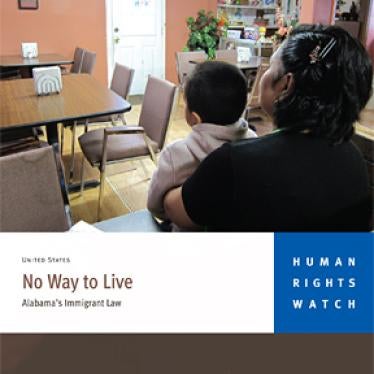(Washington, DC) – A bill before the Alabama legislature to amend the state’s law restricting immigrant rights does little to remedy the severe harm caused by the law, Human Rights Watch said today. The Alabama House of Representatives Committee on Public Safety and Homeland Security will hold a public hearing on the amendments, contained in House Bill (HB) 658, on April 11, 2012.
HB 658 tries to clarify several controversial sections of the Beason-Hammon Alabama Taxpayer and Citizen Act, commonly known as HB 56, which went into effect in September 2011. For example, it would limit the circumstances under which police would be required to verify a person’s immigration status. And while the bill would still prohibit courts from enforcing contracts between unauthorized immigrants and other parties, it would exclude contracts for legal counsel and contracts signed prior to passage of the bill.
“The biggest problem with Alabama’s immigrant law is its explicit intent to make life nearly unlivable for unauthorized immigrants in the state,” said Grace Meng, US researcher at Human Rights Watch. “The resulting rights abuses cannot be fended off with a few legislative tweaks.”
Human Rights Watch’s December 2011 report “No Way to Live” documented the Alabama law’s fundamental denial of rights to unauthorized immigrants and called for its full repeal. The law led state agencies to deny immigrant families access to basic services like water and housing, and threatened their right to equal protection of the law. The law’s stated intent – to drive unauthorized immigrants from the state – also fueled discriminatory treatment of US citizens and lawful permanent residents of Latino descent.
The US Supreme Court is scheduled to hear arguments on Arizona’s own law on immigrants, SB 1070, later in April.
Some of the changes to the Alabama immigrant law proposed by HB 658 include:
- Modifying the circumstances under which a police officer is required to verify a person’s immigration status. Under the Beason-Hammon Act, law enforcement officers must seek to verify immigration status if they have reasonable suspicion of a person’s unauthorized status during any “lawful stop, detention, or arrest.” HB 658 narrows this requirement only to “after the issuance of a traffic citation or upon lawful arrest.” At the same time, the proposed law would expand the authorization to verify immigration status to passengers in a vehicle and not just the driver.
- Specifying the “business transactions” prohibited between an unauthorized immigrant and the state are applications for license plates, driver’s licenses, and business licenses. The Beason-Hammon Act did not specify the prohibited “business transactions,” leading state and local officials to deny unauthorized immigrants access to water and renewal of registration tags for mobile homes.
- Eliminating a requirement for schools to collect data on the immigration status of their students. After the passage of the Beason-Hammon Act, many schools reported a significant drop in attendance of Latino immigrant and non-immigrant students.
The proposed changes, while acknowledging certain problematic aspects of the Beason-Hammon Act, do not address the fundamental problem with the law, Human Rights Watch said. Even with the proposed amendments, the legislation would continue to harm the citizen and legal immigrant family members of unauthorized immigrants, deny equal protection of the law to unauthorized immigrants, and invite racial profiling, in violation of US and international human rights law.
Every similar state law, from Arizona’s SB 1070 to Georgia’s HB 87, has been beset with lawsuits and injunctions. A similar bill in Mississippi died in the state senate after opposition from Mississippi businesses and law enforcement agencies.
“Instead of wasting its time trying to tidy up the Beason-Hammon Act, Alabama legislators should remember their responsibility to protect the rights of all of Alabama’s residents,” Meng said. “They can only do that by repealing the Beason-Hammon Act outright.”







